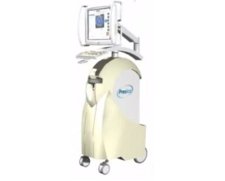
Categorised under:
Interventional Radiology
>
Oncology
>
Cryoablation
To directly compare perioperative, oncologic, and functional outcomes of laparoscopic renal cryoablation and open partial nephrectomy using a matched pair analysis.
Credits: J Endourol. 2011 Jun;25(6):991-7.
Prospectively collected data related to renal radiofrequency (RF) ablation and cryoablation procedures performed from May 2000 through November 2010 were reviewed. This included 573 renal ablation procedures performed in 533 patients to treat 633 tumors. A total of 254 RF ablation and 311 cryoablation procedures were performed; eight patients underwent simultaneous RF ablation and cryoablation. The mean age of patients at the time of the procedure was 70 years (range, 24-93 y), and 382 of 573 procedures (67%) were performed in male patients. Complications were recorded according to the Clavien-Dindo classification scheme. Duration of hospitalization was also documented.
Credits: J Vasc Interv Radiol. 2012 Jan;23(1):48-54
To assess complications, local tumor recurrences, overall survival (OS), and estimates of cost-effectiveness for multisite cryoablation (MCA) of oligometastatic renal cell carcinoma (RCC).
Credits: J Vasc Interv Radiol. 2012 Jun;23(6):770-7.
Study Type - Therapy (case series) Level of Evidence?4 What's known on the subject? and What does the study add? Percutaneous renal cryoablation is a safe and effective treatment for patients with small renal masses, who are poor surgical candidates. Oncological outcomes from previous percutaneous ablation studies are difficult to interpret because of the large number of patients treated with a history of RCC (38% in our experience) and the large number of treated renal masses without a pathology-proven diagnosis. This cryoablation study addresses these issues by evaluating only solitary, sporadic biopsy-proven RCC. Oncological outcomes and complications were also evaluated by tumour T-stage, which allows some degree of comparison with previously published surgical results
Credits: BJU Int. 2012 Dec;110(11 Pt B):E526-31.
Study Type - Therapy (systematic review). Level of Evidence 2b What\'s known on the subject? and What does the study add? The oncological success of partial nephrectomy in the treatment of small renal masses is well established. However, partial nephrectomy has largely supplanted the radical approach. In the last decade, laparoscopy has been adopted as the new surgical approach for the treatment of renal cell carcinoma. Laparoscopy offers the advantage of lower analgesic use, shorter hospital stay, and quicker recovery time. More recently, ablative technologies have been investigated as an alternative to laparoscopic partial nephrectomy. These techniques can often be performed percutaneously in the radiology suite, or laparoscopically without the need for hilar clamping. However, only the cryoablation and radiofrequency ablation modalities have had widespread use with several series reporting short to intermediate results. This review shows that both cryoablation and radiofrequency ablation are promising therapies in patients with small renal tumours (<4 cm), who are considered poor candidates for more involved surgery.
Credits: BJU Int. 2012 Aug;110(4):510-6

Did you know you can Register for FREE with this website?
Registration gives you full access to all of the features of WhichMedicalDevice. Find out more ...
WhichMedicalDevice is a FREE resource created by clinicians for clinicians.
Registration is free and gives you unlimited access to all of the content and features of this website.
Find out more...Registration is free and gives you unlimited access to all of the content and features of Which Medical Device. Find out more...
Which Medical Device is a community of clinicians sharing knowledge and experience of the devices and procedures we use on a daily basis. We ask that our members register with us so that we can maintain the unbiased and independent nature of our content. Registration is quick and free.
We do not make your details available to any third parties nor do we send unsolicited emails to our members. You can read our Privacy Policy here.